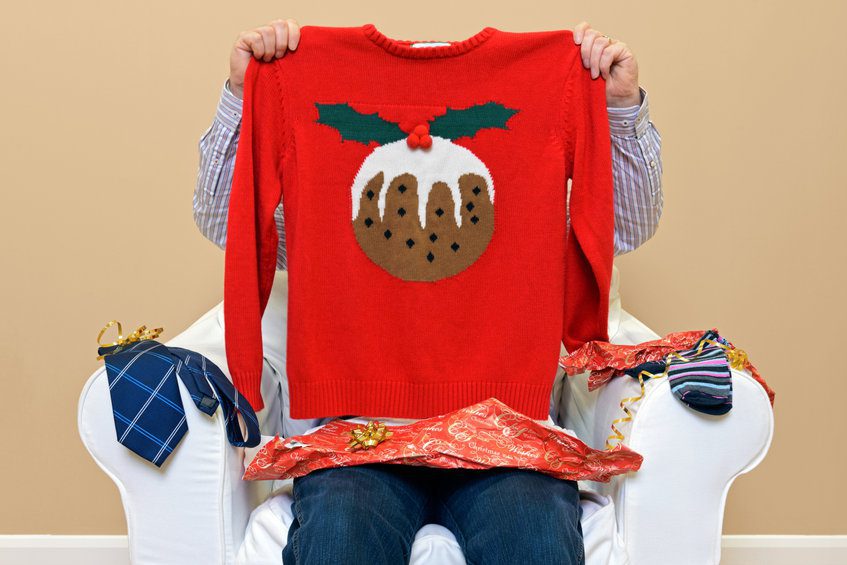This week’s musing (my last for 2021) is an updated version of an evergreen post – it seemed to fit, once again, and I hope you’ll join us in the conversation.
It was “Black Friday” when I started this post. By the time I finish and upload it, there will have been an entire weekend devoted to encouraging us to shop the right way (i.e., in a way that supports commerce). I don’t buy into Black Friday, literally or figuratively, but I know plenty of people who like to use it as a way to get all of the shopping for their holidays completed. In that sense, I suppose, you could argue that it’s a system for finishing something. Giving a time container to the shopping drill means a better chance of providing closure to what can be a stressful process. And if you’re done with the purchasing that you will do this year, awesome. You can probably put your feet up and stop here. 🙂
But if not…
Wow, is this tradition stressful in so many respects – both in the giving and the receiving. How many unwanted presents have I helped people let go of in the past eight years (“How could I let go of these polka-dot oven mitts? They came from Aunt Betty!)? How many people wring their hands for days, or weeks, before the annual gift-giving events we’ve been conditioned to respond to? I mean, the song goes “God Rest Ye Merry Gentlemen,” right?…not “God Stress ye Merry Gentlemen.”
We’re coming into the home stretch on 2021, which in and of itself is a huge gift to many of us. Another weird and too-often tragic year is behind us. Not that it was all bad, of course, but gift-giving likely isn’t even on the radar of some. And I’ve been thinking, once again, about the connections between living in a more organized, intentional way, and the whole giving presents conundrum.
Just for giggles, I looked a little into the history of this gifting business. I mean, I think we’re all somewhat aware of why exchanging presents is a big deal this time of year – because marketing has carefully trained us that it is. But where did we get this idea, way back when? You know, pre-Facebook ads? I know we can talk all about the “magic of the season” or showing how much you love someone by giving them a material thing – but when did we decide that every person we’ve ever crossed paths with needs a fruit basket or a gift card?
Turns out, the gifting tradition at this time of the year did not start with a little drummer boy, or three kings. From the Curious History website:
“Long before even Jesus stepped into the scene, ancient Romans practiced present giving, especially in the festival of Saturnalia, celebrated to give thanks to Saturn, the god of agriculture. The festivals happened for seven days (from the 17th to the 23rd of December). In addition to making sacrifices to the god, the Romans also gave gifts to each other. The most popular gifts being: fruits, nuts, candles, and cheap wines. [gee, sound familiar??] The festival went on until the fourth century when early Christian leaders phased it out as Christianity took over the Roman Empire. Even after people stopped celebrating the festival, many new Christian converts held onto the December custom.”
So. Thanks, Saturn.
Yeah, it was this guy’s fault.
Check this out – this infographic illustrates the sobering statistic that 15.2 billion dollars are spent by Americans on gifts people don’t want. That’s just dollars. Think about the time invested (wasted) in shopping. The time invested (wasted) returning. Think about the mental space taken up with working out what to do with the things we don’t want.
I also found it amusing that Gen X-ers (proudly raising my hand here) receive the highest percentage of unwanted stuff (wondering…is that because no one understands us, because we don’t want anyone to understand us, or because we don’t want anything to begin with?). I’ll go back to my Little House book series obsession and remind everyone that little Laura Ingalls was thrilled with things like a rag doll, a tin cup, and a penny. I’ll bet she had places to put those things, too.
So what are we encouraged to do? “Shop Small”? “Support Local Business”? Grab those “Cyber Monday” deals? Instead of listening to the external messages, what about going internally? Listen. Will your great uncle really mind if you don’t get him another sweater? Who is that gift really for – him, or your reactivity to the messaging you should buy him a physical present?
I might get a little hate from local retailers here, and perhaps the gift that matters most for them is making it through a very rough time. So, if there’s an opportunity to spend and keep things moving forward in that regard, ok. I’m not saying we shouldn’t give anything at all.
I think you could still frame it thoughtfully, with these parameters:
A true gift would not
- Create a dilemma
- Cause guilt (or ease guilt, depending)
- Highlight shortcomings*
- Attempt to manipulate
- Encourage reciprocation
- Expose obliviousness
- Become a burden
A true gift could
- Express appreciation
- Provide relief
- Enhance life
- Bring peace
- Inspire
- Support growth
- Demonstrate awareness
So think back – what’s one of the best gifts you ever received? Did it come with a bow, shrink-wrapped, tissue-papered, or encased in styrofoam? What made it memorable? Tell us the story of your gift in the comments.
*I have to confess…a gift certificate for organizing might do just that. Tread carefully there, y’all.





Loving that list of what a true gift would not do – that’s terrific and so true! Like everyone else, the best gift for me cannot be purchased. But I have received some wonderful gifts over the year, and the ones that show someone knows me always mean the most!
Yes, and I think fact that we can pinpoint those wonderful gifts shows how special and truly fitting they are. Thanks for commenting, Seana.
Interesting story about gift-giving. I love that you described what a true gift is! This is wonderful, I’m going to share it in my Facebook group.
I’m honored, Sabrina! Thanks for stopping by.
I especially loved the point that a true gift demonstrates awareness. The gifts that I receive, and love are ones that show the giver know who I am and what is important to me. I try to do the same with gifts I give.
“…the ones that show the giver knows who I am…” – that’s really it, isn’t it? We all need to be known and understood. Thanks for making that great point, Jonda.
This post, even more so than lists of clutter-free gifts, speaks to my own thoughts about gift-giving. Each bullet point could be a chapter in a book. “Encourage reciprocation” can lead to “Gift escalation.” Ugh!
Wouldn’t that be a useful book? All about how to give gifts responsibly and mindfully. Thanks for the thoughtful comment, Hazel!
Also, one of the best gifts I ever got was from my niece. She was 17 and we had not been close due to distance and other factors. What she gave me was a selection of several of her favorite books. Which told me: 1) she knew I was a reader and still like YA, 2) she became a reader too, 3) she cared enough to select the books and put them together and get them to me, 4) she never forgot when she was younger and I sent her a selection of my favorite books at that age.
I absolutely love the way you have summed up what constitutes (and does not constitute) a true gift! Brilliant!
Wow, Sara! I love this post and your deep dive into the history and “burdens” of gift-giving (and receiving.) And as usual, your parameters about what a “true gift” could be are outstanding.
My favorite gifts are always experiences and not things. And while I have received some wonderful physical gifts, the best gifts anyone could give me is about time- shared time or personal time or just plain good old time. That is a commodity we can never get back. Also, as someone who is in the process of “living with less,” gifts I don’t have to find a home for are especially appreciated.
This is so inspiring, and not an affiliate link or discount code in the whole thing. YES, so often, gifts are burdens or obligations, things we have to dust or dry-clean, store or maintain. And oh, my, what you said about guilt, manipulation, and obliviousness? Every holiday gift should require checking through your lists before a purchase is allowed! You’ve shown that the real gift is the mindfulness one puts into selection. Smart, you!
I love your list of what a true gift would and would not look like for the other person. What a thoughtful way to look at gift giving!
The history behind gift-giving is really interesting, Sara! I am among those who value the gift of experiences or time spent with those I am close to. I like to give gifts I make. I have received my favorite gift already this year. My sons have been estranged for about 6 years. I’m not quite sure what caused the rift – I’m not quite sure that matters. But they got together last weekend for a day. It sounds like everyone had a good time. This makes me so happy and is a wonderful gift.
What a great post and so cathartic to read in December. I hate the pressure of buying gifts at a certain time. The best gifts are ones that are given when unexpected and when the mood strikes the giver. For example, if I am so appreciative of someone’s act of kindness that I send a simple gift that shows them how much it helped me. Or I think of the perfect gift that I know someone would love but would never purchase for him/herself (ex. A special pen for someone who loves to journal and is going through a tough time – the pen might bring him/her comfort when capturing a challenging day).
I love the idea of unexpected gifts, Jill! That shows the giver is doing so with intentionality as opposed to reflexive “Oh it’s the holidays so I’d better go grab something,” mentality. Thanks for sharing the idea!
I want what people don’t want (or can’t) give me. Time! I have everything I need or want, if not I can order it. But, I live alone and just turned 70. Spending just a short bit of time with me would be priceless.
You’re so right – spending meaningful time with others is one of the best gifts we can give (and it’s been so difficult to do these past two years). I hope you have the chance to safely connect with others this season.